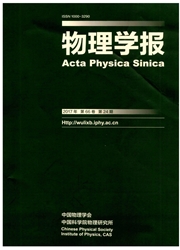

 中文摘要:
中文摘要:
低频压缩态光场可用于提高引力波探测器灵敏度,近年来受到人们的广泛关注.相对于高频段而言,低频压缩态的产生更容易受到外界环境噪声的干扰而不易被观察到.本文采用全固化单频倍频Nd:YVO4/KTP激光器作为光源,利用双波长共振的光学参量振荡器实现参量过程,以1064 nm波长的红外作为基频光,激光器腔内倍频产生的532 nm绿光作为抽运光,通过调节周期性极化磷酸氧钛钾晶体温度使光学参量振荡器达到双波长同时共振,采用真空注入的方式,利用Pound-Drever-Hall锁腔技术锁定抽运场.输出压缩光通过平衡零拍探测,最终在实验上获得了频率低至3 kHz的真空压缩,所直接观察到的压缩度为2 dB。
 英文摘要:
英文摘要:
Squeezed state of light is an important resource of optical measuerments below the shot noise limit and has been used to improve measurement sensitivity in many areas such as gravitational wave detection, especially in audio frequency region. Compared with the high-frequency squeezed states, the generation of the low-frequency squeezed states is more difficult, because it is limited by several technical noise sources. In this paper we report the observation of more than 2 d B of vacuum squeezing at 1064 nm in the gravitational-wave detection band down to 3 k Hz with a double-resonant optical parametric oscillator(OPO). The OPO has a configuration of linear cavity consisting of an input coupling mirror with a transmission of 11% at 532 nm and an output coupling mirror with the transmission of 12% at 1064 nm. The nonlinear materials in the OPO is type-I periodically poled potassium titanyl phosphate(PPKTP) crystal which is chosen for this experiment due to its higher nonlinearity, broader phase matching temperature, and smaller photo-thermal effect. The OPO is pumped by the light of 532 nm from Nd: YVO4/KTP solid-state laser of maximum optical power 3 W. To avoid various noise coupled from the seed beam, the OPO is seeded by vacuum fluctuations instead of coherent field at the fundamental wavelength(1064 nm). A Pound-Drever-Hall locking scheme is used to lock the OPO cavity length with the signal derived from the reflected pump beam, so as to lock the pump field and also lock the fundamental field. To make both the pump and seed beams resonant simultaneously, the temperature of the PPKTP is carefully adjusted.The squeezed state can be detected on a homodyne detection by interfering it with the local oscillator and detected by a balanced detector with two photodiodes(EXT500 T) but having the same quantum efficiency of 86% at 1064 nm. The subsequent electronic noise is analyzed with a low-frequency spectrum analyzer, which shows that the audio noise sources from lab enviroment, locking quality, esca
 同期刊论文项目
同期刊论文项目
 同项目期刊论文
同项目期刊论文
 期刊信息
期刊信息
